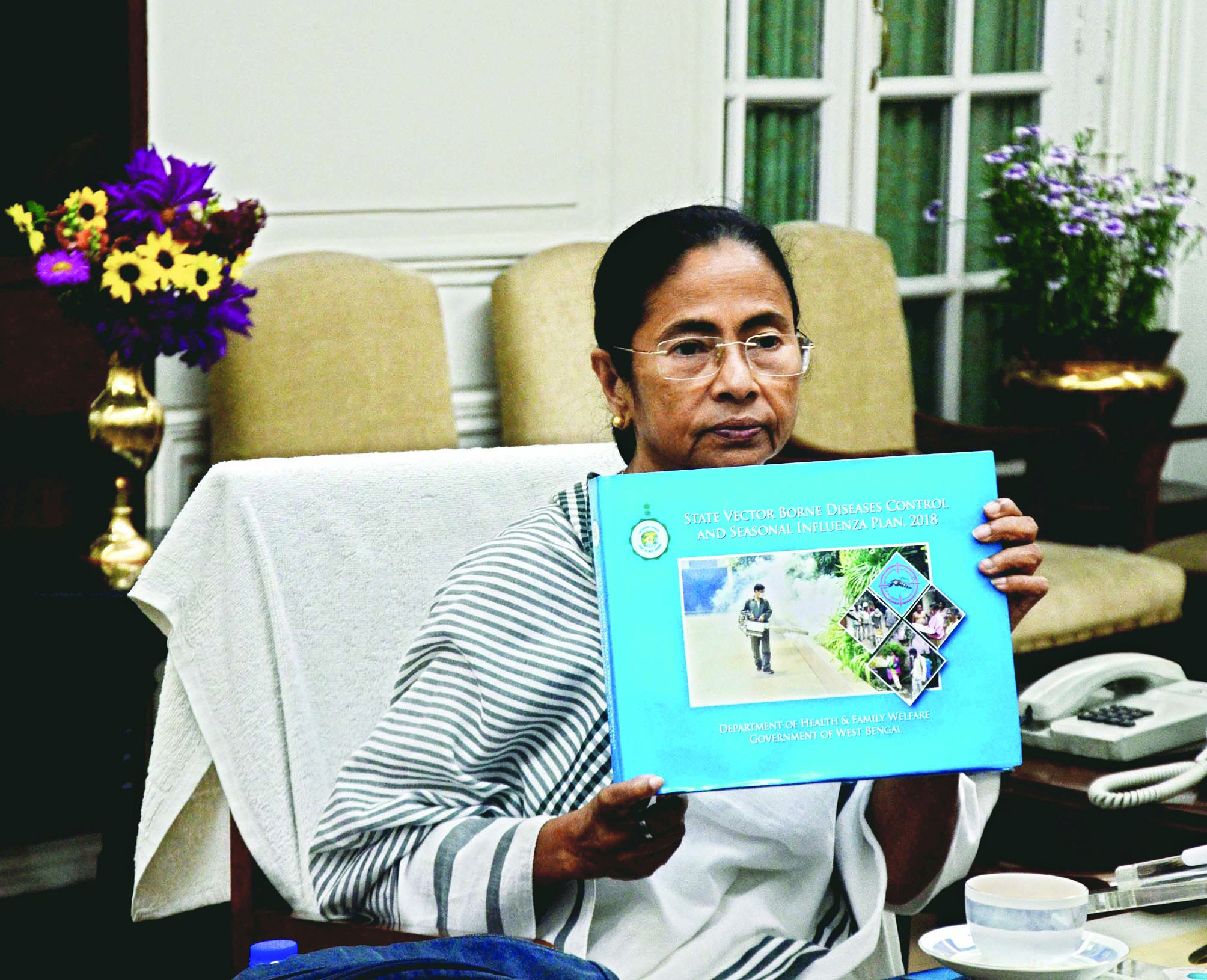The state government has developed software for data analysis to identify the level of vulnerability of vector-borne diseases in an area.
This comes at the time when the state government has also prepared an action plan to control the same.
Chief Minister Mamata Banerjee held a health review meeting in the state Assembly recently in which ministers and senior officials of all the concerned departments and civic bodies were present.
Minister of State for health, said after the meeting: “For the first time a manual State Vector-Borne Disease Control and Seasonal Influenza Plan 2018 has been released. The book contains details on proper coordination among all the concerned departments that need to work together to check the spread of such diseases.”
It may be mentioned that the Chief Minister has held several health review meetings and the state government has begun to monitor and work in tandem from January onwards to check vector-borne diseases this year. She has already held meetings in these regard with all the concerned officials and has given all the necessary directions in this connection.
Health workers are busy doing door-to-door campaigns and collecting information on the health of each and every citizen. This data will be analysed using the software to ascertain which area is more vulnerable to the outbreak of vector-borne diseases. This new concept of “dynamic monitoring” will help to reduce the number of cases of vector-borne diseases in the state.
The Bengal government has also decided to introduce nine more Elisa machines that will be in use in central laboratories. Moreover, authorities of private pathological laboratories have also been directed to inform the local civic body if they find any person suffering from vector-borne diseases.
মশা তাড়াতে নিয়মিত নজরদারি
ডেঙ্গি , ম্যালেরিয়ার মোকাবিলায় , মশার বংশ শেষ করতে নীল নকশা তৈরি করল স্বাস্থ্য দন্তর৷
কোথায় মশার প্রভাব বাড়ছে , কোথায় জ্বর বেশি হচ্ছে , তা নিয়ে নজরদারি চালাতে তথ্য প্রযুক্তি নির্ভর ‘ডায়নামিক মনিটরিং ’ ব্যবস্থার সাহায্য নেওয়া হবে৷ ডেঙ্গি আক্রান্ত কেউ বেসরকারি নার্সিংহোম বা হাসপাতালে ভর্তি হলে অথবা কোনও বেসরকারি পরীক্ষাগারে রক্তের নমুনায় ডেঙ্গির জীবাণু মিললেই মনিটরিং ব্যবস্থার মাধ্যমে সে খবর পাবে স্বাস্থ্য দন্তর৷
মনিটরিং বা নজরদারি হবে কী ভাবে?
রাজ্য সরকারের সিদ্ধান্ত , এবার থেকে পুরসভা ও পঞ্চায়েতের স্বাস্থ্য কর্মীরা ১৫ দিন অন্তর অন্তত পাঁচবার বাড়ি বাড়ি গিয়ে খোঁজ নেবেন — মশার উৎপাত সেখানে কতটা, জ্বর বা অন্য অসুখে বাড়ির কেউ ভুগছেন কি না ইত্যাদি৷ ফিরে এসে সেই তথ্যই রিপোর্টের আকারে জমা দেবেন তাঁরা৷
সংশ্লিষ্ট পুরসভা বা পঞ্চায়েত সফটওয়্যারে সেই ডাটা এন্ট্রি করবে৷ যার মাধ্যমে জেলাশাসক ও স্বাস্থ্য দন্তরের কর্তারা অফিসে বসেই কেন্দ্রীয় ভাবে নজরদারি চালাতে পারবেন৷ ফলে কোনও এলাকায় মশা বাহিত রোগ বাড়লে , তখনই তা চিহ্নিত করে ব্যবস্থা নেওয়া সম্ভব হবে৷
এর জন্য প্রত্যেক জেলাশাসকের নেতৃত্বে একটি করে মনিটরিং সেল গঠন হয়েছে৷ এই সেলে থাকছেন জেলার সিএমওএইচ, জনস্বাস্থ্য কারিগরি, পূর্ত, পঞ্চায়েত ও পুরসভার প্রতিনিধিরা৷
নতুন ন’টি পুরসভায় ডেঙ্গি চিহ্নিতকরণে অ্যালাইজা টেস্টের ব্যবস্থাও করা হচ্ছে৷ এই পুরসভাগুলি হল — খড়দহ , কাঁচরাপাড়া , নৈহাটি , বাঁবেড়িয়া , বৈদ্যবাটি , ডোমকল , ধুলিয়ান , ওল্ড মালদহ ও শিলিগুড়ি৷ বর্তমানে কলকাতা -সহ আরও ৩২টি জায়গায় ডেঙ্গি নির্ধারণের জন্য সরকারি পরীক্ষাগারে রক্ত পরীক্ষার সুযোগ আছে৷
বিধানসভা ভবনে ডেঙ্গি মোকাবিলায় ডাকা এক উচ্চ -পর্যায়ের বৈঠকে গোটা নকশাটি প্রকাশ করেন মুখ্যমন্ত্রী মমতা বন্দ্যোপাধ্যায়৷ স্বাস্থ্য দপ্তরের আধিকারিকদের উদ্দেশ্যে তিনি বলেন , ‘ডেঙ্গি সহ মশা -বাহিত রোগ নিয়ে আরও গবেষণা প্রয়োজন৷ কারণ প্রতিদিনই মশার চরিত্র বদল হচ্ছে৷ আগে ডেং ১ ও ৩ জাতীয় জীবাণু পাওয়া যেত৷ এখন ডেং ২ ও ৪ জাতীয় ভাইরাসও পাওয়া যাচ্ছে৷ এদের মারণ ক্ষমতা অনেক বেশি৷’

